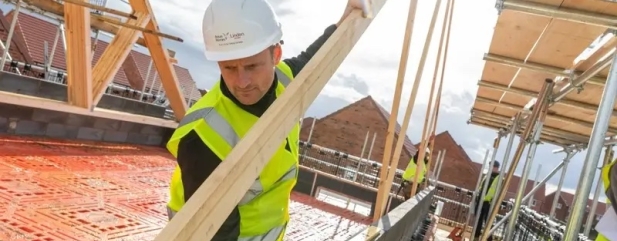Archived article
Please note that tax, investment, pension and ISA rules can change and the information and any views contained in this article may now be inaccurate.
Vistry shares are an attractive risk-reward proposition for the year ahead

Vistry Group (VTY) 588p
Market cap: £1.95 billion
We have held off from recommending any of the housebuilders over the last year as despite plenty of attractive valuations it was clear the whole sector was in a downgrade cycle.
That cycle now seems to be over, for Vistry (VTY) at least. The company was forced to warn on profits three times in quick succession last quarter, including one announcement on Christmas Eve, which was far from ideal.
In its final trading update for 2024, issued last week, however, the company confirmed its lowered profit guidance and said it would set out new financial targets in March, which we believe could be the catalyst for earnings upgrades.
The company has a significant footprint in regeneration work and affordable housing which marks it out from the rest of the peer group.
‘ANNUS HORIBILUS’
The year began on a positive enough note with chief executive Greg Fitzgerald citing ‘good demand in the partner funded market accompanied by an improving trend for our open market sales’ in the firm’s mid-May trading update.
At that stage, the group was on track to deliver more than 18,000 completions, higher than its previous forecast of 17,500 and 10% more than in 2023.
Half-year and full-year profit were also expected to be ahead of 2023 underpinned by a strong forward sales position totalling £4.9bn, up 10% on the same position a year earlier.
Fitzgerald claimed the firm had a high level of visibility on forward sales, was confident in its differentiated strategy and was ‘making good progress’ towards its medium-term targets.
In September, the company reiterated its target of 18,000 completions, bolstered by a forward sales position of £5.1 billion at the end of the first half, up 19% on the previous year, with 91% of 2024’s deliveries forward sold.
Also, despite starting the year with a net debt position £207 million higher than the prior year, the group was targeting a net cash position in December 2024.
BAD NEWS COMES IN THREES
However, in early October the firm dropped the bombshell that within its South Division the total full-life cost projections to complete nine developments, including ‘some large-scale schemes’, had been understated by around 10% meaning it would have to take an impairment of £115 million.
The charge would be incurred over 2024, 2025 and 2026, with the bulk (£80 million) falling in 2024 reducing pre-tax profit to £350 million.
By November, the total charge had risen to £165 million, with £105 million falling in 2024, and pre-tax profit guidance was revised down to around £300 million.
The company also flagged a slowdown in partner funded demand, partly due to caution ahead of the Autumn Budget and partly due to still-elevated interest rates which meant projects needing a higher level of funding were being delayed.
Demand from registered providers of social housing was described as ‘uneven’, although demand from the private rented sector was said to be strong.
In December, the mood darkened further as the firm cut its pre-tax profit guidance for a third time, to £250 million, primarily due to delays to deals and completions which had been expected to complete before year-end, while admitting it would now end the year with net debt not net cash. Vistry said it had chosen not to proceed with a number of proposed deals ‘where the commercial terms were not sufficiently attractive’.
The chief executive called the downgrade disappointing but stuck to his targets of 5% to 8% annual revenue growth, £800 million of EBIT (earnings before interest and tax) and £1 billion of shareholder returns over the next three years.
‘MATERIAL UPSIDE’
While this month’s trading update didn’t dispel all the ghosts, it was enough to mollify analysts and investors and for the shares to rally 10%, which doesn’t guarantee the bottom is in but is a good sign, nonetheless.
Thankfully, the issues at the South Division weren’t systemic, but given how rapidly the group has expanded in recent years – consolidating Bovis Homes, Linden Homes and the Galliford Try partnership business, then absorbing Countryside – it’s not surprising someone’s eye wasn’t as on the ball as it should have been.
Controls have been enhanced and procedures tightened around monthly site cost reviews and there has been increased investment in commercial assurance, while to shorten lines of communication six divisions have been consolidated into three, each led by a former divisional chair with extensive partnerships experience who reports directly into Greg Fitzgerald.
Looking ahead, the firm’s focus this year is ‘increased capital discipline and cash generation’, starting with a reduction in stock and work in progress after slower open-market sales resulted in a build-up last year, tying up working capital.
Build cost inflation is seen as manageable, as is the increase in employer national insurance, and the group ‘expects to make progress in both profit and cash generation’ in 2025, while it will issue updated medium-term targets in March.
As analyst Chris Millington at Deutsche Numis rightly says at this early stage there is no point anyone changing their full-year 2025 estimates, but if Vistry can just execute on its current targets there is ‘very material upside in the share price’ and we are inclined to agree.
Important information:
These articles are provided by Shares magazine which is published by AJ Bell Media, a part of AJ Bell. Shares is not written by AJ Bell.
Shares is provided for your general information and use and is not a personal recommendation to invest. It is not intended to be relied upon by you in making or not making any investment decisions. The investments referred to in these articles will not be suitable for all investors. If in doubt please seek appropriate independent financial advice.
Investors acting on the information in these articles do so at their own risk and AJ Bell Media and its staff do not accept liability for losses suffered by investors as a result of their investment decisions.
Issue contents
Feature
Great Ideas
Money Matters
News
- IG Design shares hit two-year low after major US customer re-enters Chapter 11
- FTSE 100 hits all-time high on easing inflation and year-low in sterling
- Trustpilot shares soar 61% over the past six months
- Trump promises a ‘golden age of America’ at the expense of trade partners
- Will Royal Caribbean Cruises continue to benefit from robust demand and pricing trends?
- Cloud growth, AI appetite and margins crucial for big tech earnings
 magazine
magazine








